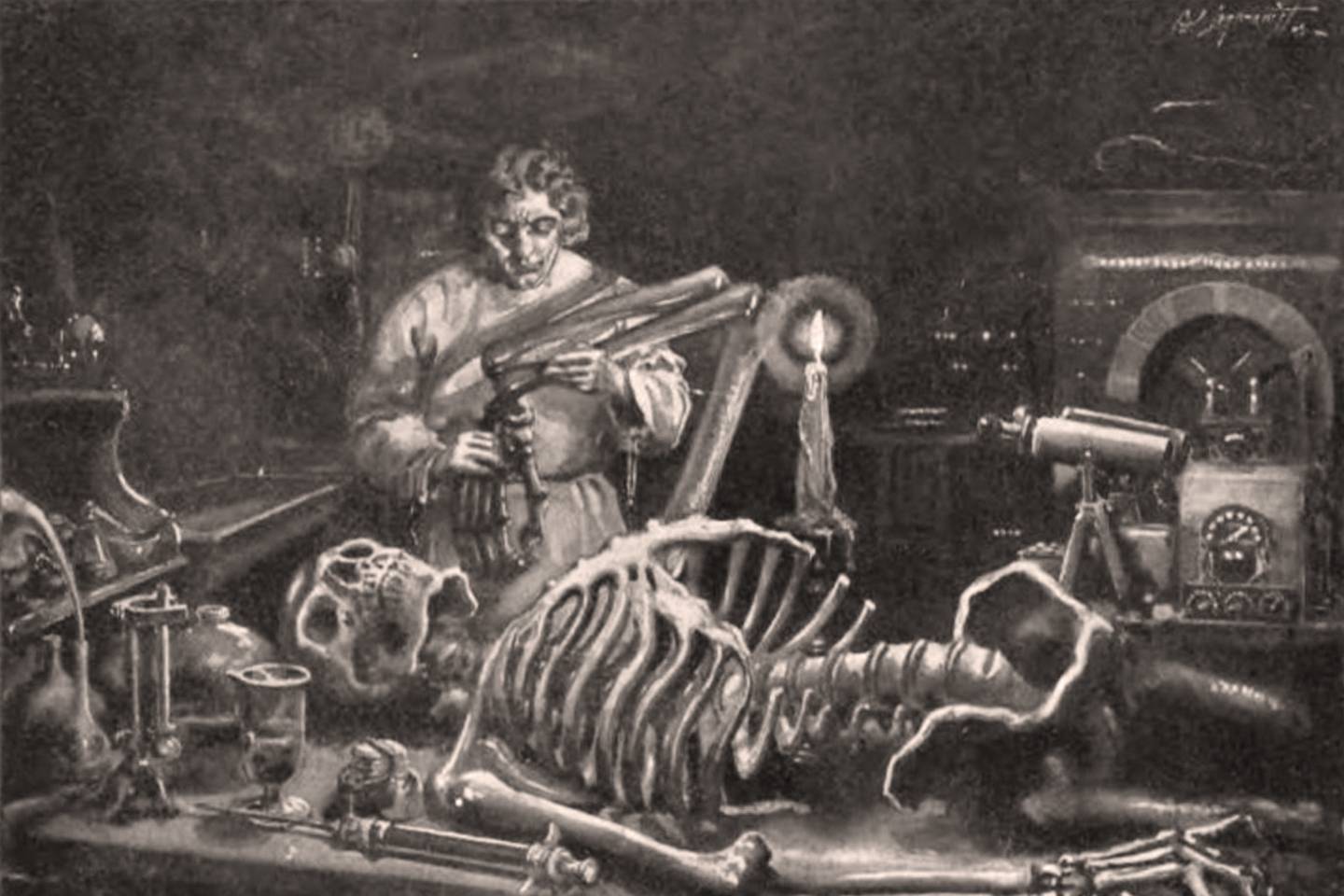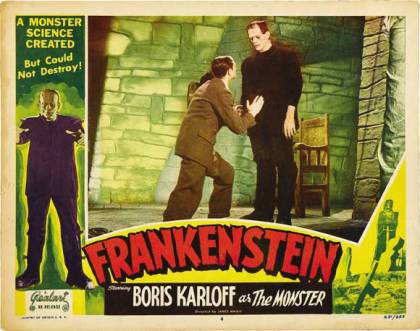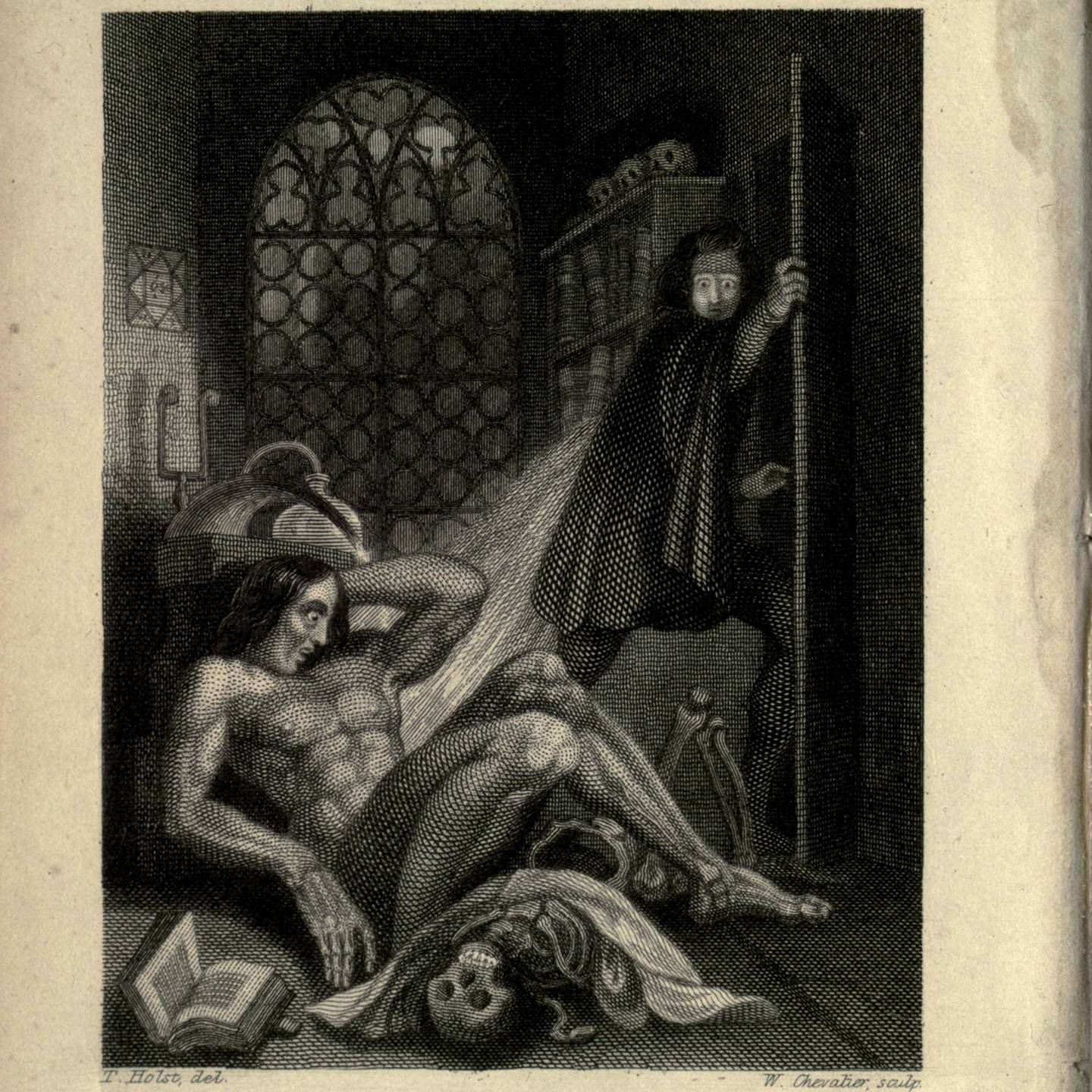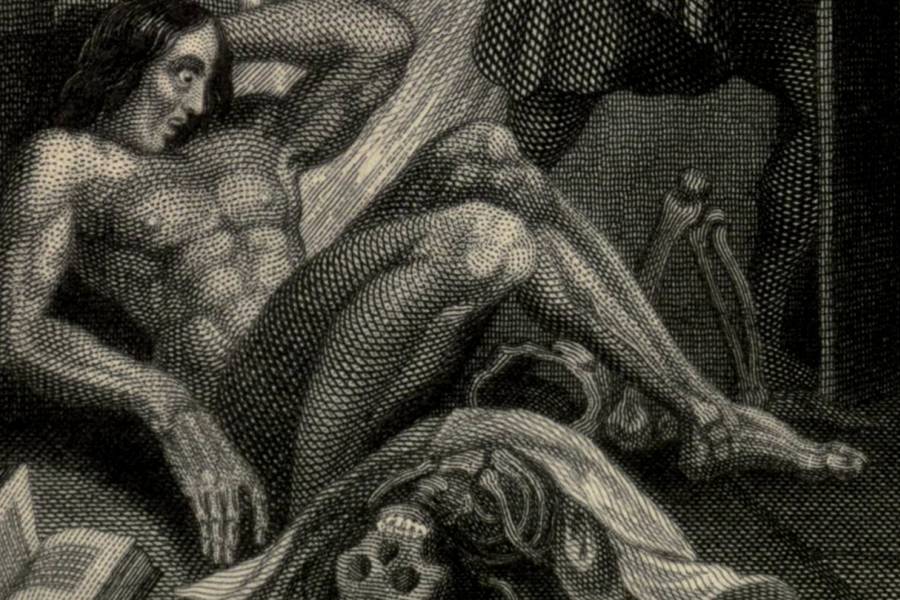Mary Wollstonecraft Shelley was just 18 years old when she decided to become immortal.
In one of literature's most enduring back stories, the young woman traveled to Lake Geneva in 1816 with the poet Percy Bysshe Shelley (who would become her husband) and his friend Lord Byron. They decided to have a contest: Who among them could write the best horror story?
Her contribution to the contest, the story of a mad scientist assembling a collection of human body parts into a "hideous phantasm of a man" and reanimating the corpse, would become her groundbreaking novel, Frankenstein: or, The Modern Prometheus. Published anonymously in 1818 and properly credited to Shelley in 1823, the novel is widely considered to be the world's first science fiction novel, the first modern horror novel, and a source for a steady stream of cautionary tales of the hubris of male scientists and monsters as metaphors for larger social anxieties.
For the bicentennial anniversary of Shelley's novel, the Alexander Grass Humanities Institute at Johns Hopkins University has put together a pair of film screenings and a panel discussion to talk about its enduring legacy. Media+Monsters: Two Centuries of Frankenstein takes place Wednesday at the Stavros Niarchos Foundation Parkway theater and will feature a screening of Bride of Frankenstein at 2 p.m. and Young Frankenstein at 6:30 p.m., with the panel discussion featuring Hopkins experts taking place between the showings.
Is there a better way to spend Halloween next Wednesday than celebrating #Frankenstein200? We think not! 🎃
— Johns Hopkins U. (@JohnsHopkins) October 25, 2018
Join us at the Parkway Theatre in Baltimore on Oct. 31 for an afternoon of classic films and smart conversation - open to all! Details + register: https://t.co/USauy5MuYj… pic.twitter.com/wvEMSjVoKX
The Hub caught up with a few of the panelists to talk about Victor Frankenstein, his hideous monster, and what Shelley's story tells us about being human in the 21st century. Boo.
William Egginton, director of the Alexander Grass Humanities Institute
What makes Frankenstein a horror novel as we might talk about it today?
Mary Shelley's brilliance was to realize that life itself, that which brings us joy, that enables human existence as such, is also the fundamental source of horror, and to locate a new originator of that horror in the "man of science" who had come to symbolize European cultural and political domination. Stories of the ill effects of human, and most often male, hubris as it transgressed religious and cultural prohibitions had been universal staples of myth and literature, from Adam and Eve to the original Prometheus to Oedipus to Milton's Satan. Victor Frankenstein translates that drive and its consequences to the realm of Western man's ostensibly unqualified strength: reason. If Goya would imagine the "sleep of reason" as producing monsters, Shelley's insight was how reason unchecked could do so all the more so.

Image caption: Etching titled "Frankenstein at work in his laboratory" included in a 1922 edition of Shelley's Frankenstein.
Image credit: Wikimedia Commons
What themes or disruptions do you feel Frankenstein explores that speak to the world we live in now?
Frankenstein is so prescient because [Shelley] sensed from the vantage of a world on the brink of scientific and technological revolutions that would change the face of the planet itself, and threaten its very existence, that the power of reason had a compelling and deeply worrisome dark side to it. We are living those worries out today in so many ways, from the unexplored risks of genetic research to the promises and dangers of AI and the "rise of the machines" to the now snowballing and likely unstoppable effects of climate change that may leave large portions of the most densely populated regions of the globe uninhabitable within the century. Frankenstein's monster, amazingly, presages all that.
As monsters go, what makes Shelley's scary for you, and why? As in, for me, Dr. Frankenstein's monster isn't so much scary as unsettling, as it's an unknown I can't know, whereas zombies completely terrify me because I know it's a person with no there there.
As you know, I've written about zombies, and to coin a phrase, Frankenstein's monster is no zombie! He's unsettling, as you put it, because he embodies and contains exactly what zombies lack; in some ways he's the complementary inverse to zombies. Whereas they represent the detritus of unchecked technological innovation and capitalist expansion (think of the mindless Romero hoards clawing at the windows of the mall where the survivors have holed up), the monster crystalizes what the subjectivities that are forgotten in the drive to assert a European, colonialist, patriarchal drive as the neutral and unproblematic norm of knowledge formation. Romero's zombies start to achieve this status only in his last movie, Land of the Dead, when they start to register a glimmer of self-realization that turns into concerted political action.
Linda DeLibero, professor in Film and Media Studies
It seems visualizing Frankenstein's creation on screen has been around as long as commercial cinema. What do movies add to thinking about monsters?
I honestly think that if you try to put that creature in the book on the screen, it just doesn't translate because it's not a visual entity, it's a thinking entity. Very little of Shelley's description of the Creature is given over to physical detail. He's an eloquent being who wrestles with philosophical questions and reads Milton and Goethe, and in James Whale's Frankenstein—at least the first one—the Creature doesn't speak at all. He grunts. So film completely changes the whole nature of that monster conception, and it becomes about the monstrousness of how one appears to the world.

Image caption: Lobby card for Universal Studios' 1931 production of Frankenstein starring Colin Clive and Boris Karloff as the monster
Image credit: Wikimedia Commons
And this dichotomy between looking hideous and having emotions that are not expressed by one's looks—that's partly what fascinates me about the cinematic Frankenstein. Questions about technology or science run amok interest me less than the question of, What makes us human? What does "human" look like? Shelley is talking about reanimating humans, not inventing something inanimate. So Frankenstein is about reviving something that was living and it comes out reconceived—both monstrous and human. And when you turn that into a cinematic creation you, of course, have to do it visually.
When we think about Frankenstein cinematically, we're usually thinking about monsters. But listening to you, I imagine you're thinking about the more human qualities than what we usually talk about when we talk about monsters, yes?
I think it's a question of what is the self? What is personality? How is it formed? Basic questions about nature versus nurture, which is very important in cinematic versions, even in Young Frankenstein.
The big joke in the original Whale film is when [Fritz] drops the brain he's supposed to bring to Victor Frankenstein and he has to take the abnormal brain instead. That scene of accidentally switching the genius brain for the abnormal, or criminal, brain is repeated in Young Frankenstein. But in Mel Brooks' version, the whole project is to love the creature and teach him how to be human, to subvert his nature through nurture. Brooks reverses the notion implicit in the book, where the problem is that Victor Frankenstein is a really bad parent and completely abjures all responsibility for this creature that he's made.
So if I ask you who your favorite film monsters are, who might they be? The human monsters?
Yes, because it's this question of where do the monster's feelings of tenderness come from? Where is the origin of that impulse to be loved and to be loving? It's clear that Shelley sees this as something originary because the only reason Frankenstein's creation is angry and violent is because people treat him badly.
That's what interests me, and when I think about how that character influenced film I tend to think about human monsters like Norman Bates, who is a perversely ambiguous antihero, both murderous and deeply sympathetic. I was also struck very forcibly by the similarities between the Frankenstein creature and, of all people, Plato in Rebel Without a Cause, the Sal Mineo character. Who, like many monsters, is an id, this impulsive creature who acts out of instinct. He's an anarchic force, without boundaries, whom everybody finds appealing but terrifying. Plato is that character who becomes this wildly attractive figure of sympathy even though he's violent and he has to be destroyed—like all monsters. Because you can't have that kind of unruly energy running around. It's not good for order and civilization!

Image caption: Inside cover art from the 1831 edition of Frankenstein
Image credit: Wikimedia Commons
Yulia Frumer, assistant professor in the History of Science and Technology
You're currently researching the development of Japanese humanoid robotics. How does culture affect how we think about and respond to the things we call monsters and the stories we tell about them?
Roboticists are human, which means that their understanding of the world is informed by the things they are exposed to—including novels, anime, manga, but also scientific debates, social philosophies, linguistic metaphors, and many factors that eventually find expression in the particular technological designs they come up with. At the same time, sci-fi novelists, film directors, and animators are influenced by their science education and recent technologies. So there is a kind of dynamic between roboticists and artists.
In Japan, artificial humans—both real and fictional—were gradually stripped of the scary and monstrous characteristics and infused with cuteness. One early 20th-century Japanese roboticist, for example, found European portrayal of robots as monsters to be "contrary to laws of nature" and created his own affable robot. This robot inspired future Japanese animators, who, in turn, inspired future roboticists, etc., etc.
Would you consider Dr. Frankenstein's monster a kind of robot? Is it giving a man-made creation a face that pushes it from merely machinelike into the more uncanny-valley territory of artificial humans?
I don't think that the creature made by Victor Frankenstein is a robot. It was neither mechanical—Victor created it by alchemical means—nor was it made to work, as the etymology of the word "robot" suggests. But it is definitely an artificial human, so that ethical questions raised by Mary Shelley 200 years ago are absolutely applicable to 20th- and 21st-century humanoid technologies.
Has your research caused you to reconsider your understanding of "monsters" as they're portrayed in the West? As in, given what you now know, how might you respond to Shelley's creation in Frankenstein if you were reading it for the first time today?
Absolutely. Seeing how Japanese roboticists eliminated scary features from robotic designs, I can better see which characteristics would trigger fear and which would evoke affection. Those that trigger fear in Europe and in North America are often associated with events or technologies that are scary in real life—such as radioactivity or electric chairs. And I actually find that Japanese attitudes toward artificial humans are much closer to Shelley's original message than the current prevalent attitudes in the U.S., which were inspired by the early 20th-century Frankenstein films. Like Shelley, people in Japan don't think that being man-made inherently makes a humanoid machine into a monster. Rather, it is the way that flesh-and-blood humans treat those machines that makes them into a friend or a foe.
Jeffrey Kahn, director of the Berman Institute of Bioethics
Are some of the themes raised by Shelley's novel the pressing ethical concerns facing scientists and researchers today?
Definitely—technologies such as animal-human chimeras and human-machine interfaces are turning what were once interesting science fiction questions into real issues that need to be addressed. What are the implications of work that "humanizes" animals to create models for the study of human diseases—rats with humanlike livers, pigs with humanlike kidneys, and especially animals that have human neural cells to mimic human neurological disease models.
Real talk: Are scientists close to creating full-fledged human-machine hybrids like in the RoboCop films, or is that an anxiety I can file away below climate change as things I need to be concerned about in my lifetime?
I think you've got it right—no cyborgs on the near horizon, though some of the same issues may arise sooner than later as machine learning and AI continue to make strides toward "thinking" machines.
Not to get too Dr. Who-y, but imagine yourself transported back in time and into Shelley's novel. As a bioethicist, what questions would you want to ask Dr. Victor Frankenstein about his experiments?
Great question. I'd ask whether he was experimenting with what it means to be human, with the power to create something like life, or was his work more a response to his loneliness? Or some combination of all? And what did he think he learned?
Posted in Arts+Culture, Voices+Opinion
Tagged literature, bioethics, film and media studies








